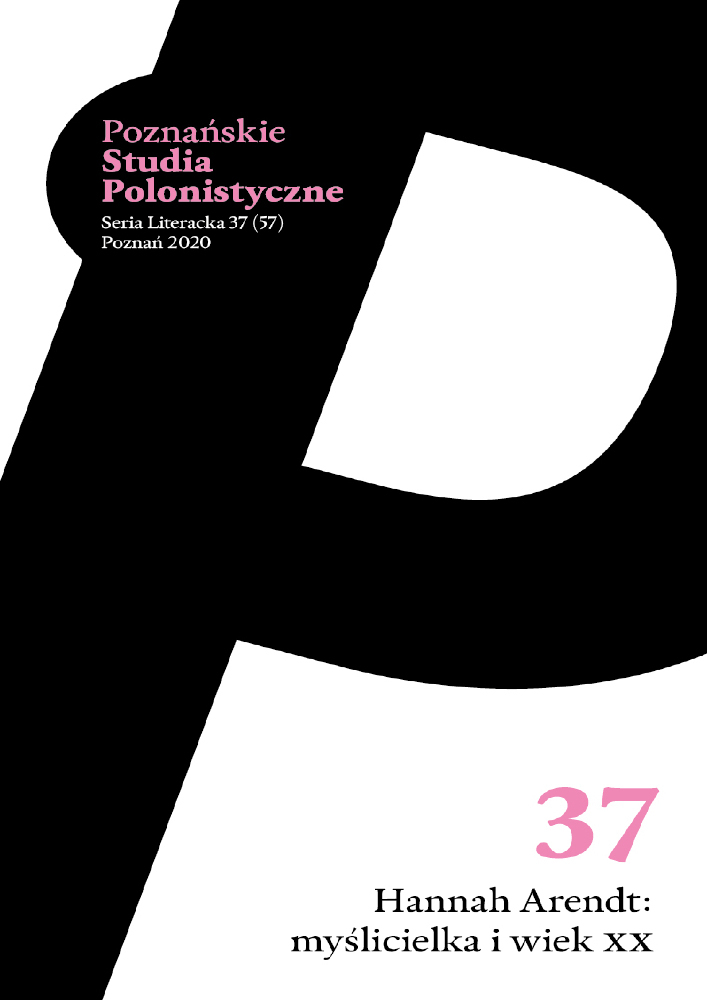Abstract
The article attempts to trace Hannah Arendt’s presence in Gustaw Herling-Grudziński’s writing. The first time she appears in his texts is as the author of Eichmann in Jerusalem: A Report on the Banality of Evil – a book
that the writer considered an exceptionally important voice in reflections about the nature of totalitarian systems and in the dispute over the nature of evil both in individual and metaphysical sense. Arendt’s analyses of basic dehumanisation mechanisms were close to him; he is fascinated by the soundness of Arendt’s key thesis on the ‘banality of evil.’ At the same time, Herling-Grudziński disputes with Arendt, indicating certain shortcomings in her thinking, mostly related to cognitive limitations resulting from her
proposed take on the key problematics and partial disconsonance between theoretical disquisitions and existential experience. This criticism is limited and eventually Herling-Grudziński himself disputes with Arendt’s main critics. These issues are discussed in the final section of the article.
References
Arendt Hannah (1963), Eichmann in Jerusalem. A Report on the Banality of Evil, The Viking Press, New York.
Arendt Hannah (1964), La banalità del male. Eichmann a Gerusalemme, Feltrinelli, Milano.
Arendt Hannah, Jaspers Karl (1992), Correspondence 1926-1969, przeł. Robert Kimber i Rita Kimber, red. Lotte Kohler i Hans Saner, Harcourt Brace & Co, Orlando FL.
Arendt Hannah (1993), Korzenie totalitaryzmu, przeł. Mariola Szawiel i Daniel Grinberg, NOWA, Warszawa.
Bernstein Richard J. (1996), Hannah Arendt and the Jewish Question, Polity Press, Cambridge.
Bolecki Włodzimierz (2005), Ciemna miłość. Szkice do portretu Gustawa Herlinga-Grudzińskiego, Wydawnictwo Literackie, Kraków.
Deaglio Enrico (1991), La banalità del Bene [Banalność dobra], Feltrinelli, Luglio.
Heitzmann Daniela (2008), Coping with the Past: the Controversy regarding Hannah Arendt’s „Eichmann in Jerusalem”, w: Totalitarianism and Liberty. Hannah Arendt in the 21 Century, red. Gerhard Besier, Katarzyna Stokłosa, Andrew Wisely, Księgarnia Akademicka, Kraków, s. 339-362.
Herling-Grudziński Gustaw (1963), Drugie Przyjście oraz inne opowiadania i szkice, Instytut Literacki, Paryż.
Herling-Grudziński Gustaw (1998), Dziennik pisany nocą 1993-1996, Czytelnik, Warszawa.
Herling-Grudziński Gustaw (2000a), Dziennik pisany nocą 1997-1999, Czytelnik, Warszawa.
Herling-Grudziński Gustaw (2000b), Tak, taki jestem, rozm. przepr. Anna Bikont i Joanna Szczęsna, „Gazeta Wyborcza”, 29 kwietnia –1 maja, s. 17.
Herling-Grudziński Gustaw (2016), Eseje, Wydawnictwo Literackie, Kraków, s. 105-114.
Herling-Grudziński Gustaw (2017), Dziennik pisany nocą, vol. 1: 1969-1981, Wydawnictwo Literackie, Kraków.
Herling-Grudziński Gustaw (2018), Dziennik pisany nocą, vol. 2: 1982-1992, Wydawnictwo Literackie, Kraków.
Kateb George (1984), Hannah Arendt: Politics, Conscience, Evil, Martin Robertson, Oxford.
Kristeva Julia (2007), Geniusz kobiecy. Hannah Arendt. Biografia, przeł. Jacek Levin, KR, Warszawa.
Kudelski Zdzisław (1991), Czy pisarska porażka? (O „Dzienniku pisanym nocą”), w: tegoż, Pielgrzym Świętokrzyski. Szkice o Herlingu-Grudzińskim, FIS, Lublin, s. 117-136.
Meuschel Sigrid (2004), The Institutional Frame: Totalitarianism, Extermination and the State, w: The Lesser Evil. Moral Approaches to Genocide Practices, red. Helmut Dubiel i Gabriel Motzkin, Routledge, London–New York, s. 109-124.
Naumann Klaus (1994), Sympathy for the Devil? Die Kontroverse um Hannah Arendts Prozeßbericht „Eichmann in Jerusalem”, „Mittelweg 36”, nr 1, s. 65-79.
Panas Paweł (2012), Doświadczenia religijne w twórczości Gustawa Herlinga-Grudzińskiego, Wydawnictwo KUL, Lublin.
Przybylski Kazimierz (1991), Być i pisać. O prozie Gustawa Herlinga-Grudzińskiego, a5, Poznań.
Szaruga Leszek (1997), Szczerość i prawda, w: Herling-Grudziński i krytycy. Antologia tekstów, wybór i oprac. Zdzisław Kudelski, Wydawnictwo UMCS, Lublin, s. 15-16.
Todorov Tzvetan (1991), Face à l’extrême, Seuil, Paris.
Wyka Marta (1991), Nasz wiek według Herlinga-Grudzińskiego, w: Etos i artyzm. Rzecz o Herlingu-Grudzińskim, red. Seweryna Wysłouch i Ryszard Kazimierz Przybylski, a5, Poznań, s. 145-155
License
Authors
Authors of texts accepted for publication in „Poznańskie Studia Polonistyczne. Seria Literacka” are required to complete, sign and return to the editor's office the Agreement for granting a royalty-free license to works with a commitment to grant a CC sub-license.
Under the agreement, the authors of texts published in „Poznańskie Studia Polonistyczne. Seria Literacka” grant the Adam Mickiewicz University in Poznań a non-exclusive, royalty-free license and authorize the use of Attribution-NoDerivatives 4.0 International (CC BY-ND 4.0)Creative Commons sub-license.
The authors retain the right to continue the free disposal of the work.
Users
Interested Internet users are entitled to use works published in „Poznańskie Studia Polonistyczne. Seria Literacka” since 2016, for non-commercial purposes only, under the following conditions:
- attribution - obligation to provide, together with the distributed work, information about the authorship, title, source (link to the original work, DOI) and the license itself.
- no derivatives - the work must be preserved in its original form, without the author's consent it is not possible to distribute the modified work, such as translations, publications, etc.
Copyrights are reserved for all texts published before 2016.
Miscellaneous
Adam Mickiewicz University in Poznań retains the right to magazines as a whole (layout, graphic form, title, cover design, logo etc.).
